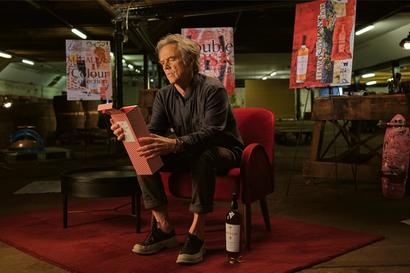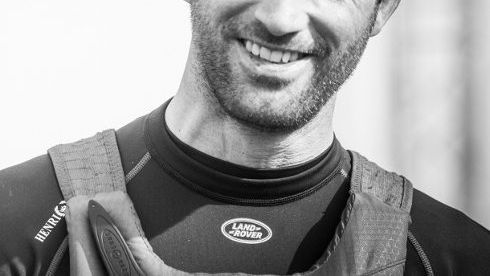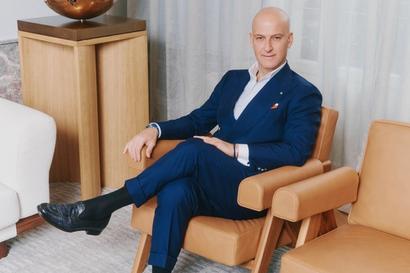

Interview: Ben Ainslie on ending Britain’s longest losing streak
- Words: Alex Woodhall
Getting up close and personal with Sir Ben Ainslie as he prepares to battle for the prestigious trophy that has eluded Britain for 164 years. The Gentleman’s Journal took to the water with Land Rover BAR and quizzed the most successful sailor in Olympic history on his peerless career.
If the boat capsizes, take a breath, compose yourself and don’t panic.” These are my seemingly impossible instructions from Ben Williams, head of conditioning for Land Rover BAR (Ben Ainslie Racing). I’m currently in the midst of a safety briefing prior to getting out on the water with Ben Ainslie, Giles Scott and co. for the Gothenburg regatta of the America’s Cup World Series. That capsize is a very real threat considering the conditions off the Swedish coast. There are a lot of instructions to take in; where to position myself, how to move around and ultimately how to stay safe. To say I’m apprehensive would be an understatement. My sailing experience is at this point non-existent – the occasional ferry and odd speedboat the extent of my aquatic dealings – but with an elite swimmer watching out for me and Britain’s most decorated sailor at the helm, I can’t help but be put at an anxious ease.
As I’m being told, in no uncertain terms, how not to perish at the mercy of the water should I come off the catamaran at 30-plus knots, Sir Ben Ainslie and crew are warming up, being contorted into positions I previously thought not humanly possible. The mood in the base is focused, although not frosty. The team introduce themselves as they go about their business, preparing to do battle just off the Scandinavian shore. The incongruity of a fan, some stranger off the street being allowed to join the boat alongside Olympic athletes for a competitive race is not lost on me. It’s the equivalent of adding a passenger seat to a Formula One car or a 16th man at the Rugby World Cup. That saying, the privilege hasn’t gone over my head either.
Kitted up and desperately trying to keep this newfound sailing knowledge at the fore of my mind, I board the spectator boat. I’m due to join Land Rover BAR for the second race of the day, if the wind speed can keep itself down – anything above 15 knots and the sixth man won’t be allowed to get out on the blue. The first contest ends in a second placed finish for the British – defending champions USA’s Oracle, bankrolled by Larry Ellison, taking victory. Unfortunately, the opportunity to experience an America’s Cup race in full tilt first-hand is snatched away; Mother Nature conjuring a gust above that 15-knot threshold. Fortuitously, speed trials are scheduled in the Gothenburg harbour at the conclusion of the day’s racing.
The boats used for this year’s America’s Cup are AC45 hydrofoiling racing catamarans; speed machines of carbon-fibre reinforced resin capable of reaching up to 35 knots. The hydrofoiling aspect of that is key – these vessels don’t stay in the water much. Once they reach a few knots, which doesn’t take long, the hulls are lifted out of the water, dropping drag and increasing speed. They essentially hover above the surface as they circumnavigate checkpoints. The ride is reasonably calm until the crew hit the starting point, then the rush of blood, wind and acceleration kicks in; make no mistake, these are pitched as the ocean’s equivalents of Formula One cars and they live up to the billing.
The first time the hulls foil it takes me by surprise – I’m positioned at the rear with just a small patch of net as wide as I am to sit on and a fine line of rope to hold onto. One moment you’re crashing around, a face full of spray and the boat creaking under strain, then the crew get it up and the vessel is gliding across the water faster than the wind, yet without barely a murmur. After a good half an hour of roaring around the harbour – in truth I was more focused on holding on then looking at my watch – the boat is brought into moor. Our times are not quite enough to clock top spot, Team New Zealand held that honour, although they got better luck with the gusts; or so they tell me.
Sea legs well and truly found, it’s time to get to business and sit down with Sir Ben to chew the fat on everything from the America’s Cup, his Olympic experiences and a peerless career that has seen him surpass any other sailor ever to take to the water.
“We wouldn’t be doing this [the America’s Cup] if we didn’t think we could win it,” he tells me with an unwavering confidence. His assurances are even more impressive considering his team have just let their advantage at the zenith of the table slip, testament to his experience-hardened belief. His initial approachability strikes me also, more so considering he’s just finished the routine post-race media commitments prior to our sit-down interview.
“We start on the back foot a little bit compared with the other teams. For us it’s an element of catch up and that’s where it’s difficult as the first generation team, but I think with the people that we’ve put together, we’ve got the ability to do it.” The America’s Cup has forever eluded Great Britain since the first contest around the Isle of Wight in 1851 – Ben Ainslie has now put his name at the fore in an effort to end the country’s longest sporting barren streak. He launched Ben Ainslie Racing last year with the aim of bringing the Auld Mug home and with his moniker above the door, so to speak, there’s added weight for him to deliver, although that doesn’t appear to concern him – he’s used to all of the circus by now. “Inevitably, there’s going to be a lot of expectation, a lot of pressure, but you have to accept that with these things. All we can do as a team is focus on being as best prepared as we possibly can.”
His involvement in the contest has, as expected, drummed up interest like never before. The first regatta in Portsmouth astonishingly attracted close to a quarter of a million spectators, something Sir Ben is keen to maintain. This isn’t an exercise in growing his personal celebrity however – his legacy is all but written with the records he’s set. The decision to use his name was more commercial. A means of establishing a team on a footing in a competition where money very much talks. “There was a lot going on with the 2012 Olympics and we used my profile to try and give the team a basis. We’ve grown it up from there.”
Those London Olympics are, unfortunately, to be his last as he’s decided to step down from Olympic sailing, the event which he competed and made his name in from the age of 18. A fitting end that no one can argue with, although a decision he surprisingly describes as a “no brainer”. “They always say you know when it’s the right time and being able to bow out with a gold medal at the home Olympics, I didn’t have to think twice. Having had the opportunity now to set this team up and where we’re going with it, there’s such an amazing opportunity – it rightly requires 100 per cent of my time and attention.” Whether the same sentiment remains when British hopefuls battle it out in Brazil remains to be seen.
That final bow, nevertheless, ranks as the pinnacle of his extraordinarily illustrious career. “London 2012, to win, it was a fourth gold medal. It broke the record in terms of sailing for the most medals won by an individual, so to make history on home waters at a home Olympics, it’s going to be hard to beat that.” And how would bringing home the America’s Cup in 2017 rank against his Olympic accolades? “That would probably top it.” This might seem like a strange admission to the casual observer, but it contextualises the stature that the America’s Cup holds in the sailing world. It is the World Cup final, the fifth Ashes test, the deciding Grand Prix of the season – a victory can concrete sporting immortality and evidently eclipse even the highest of Olympic triumphs.
The taste of glory in the competition is hardly alien to Ainslie though. He successfully masterminded team Oracle’s victory in 2013, coming on board late to turn the contest around – although he’s expectedly modest about his part, the perfect gentleman unwilling to be seen as the chief catalyst. “That was really a team effort. There were individuals singled out – Jimmy [Spithill] the skipper and obviously myself a little bit coming into the team as a tactician – but really it was a team effort that pulled us through.” Have no doubt, if Land Rover BAR was to bring that trophy home in 2017 it would be hard to imagine Ainslie being so restrained on the outcome, but at 38 he currently doesn’t have any plans to call it a day after that, win or lose. “Our goal is to create a sustainable business for the future. It’s not a one-hit wonder. We’ll be around for many years to come. We really want to make a statement in the British marine industry and help to boost that and build the business out, with the core being racing and the America’s Cup.”
This competition unfortunately holds painful memories for Ainslie also. He tragically lost friend and fellow sailor Andrew Simpson to a capsize in San Francisco Bay whilst the gold medalist was training for the America’s Cup in 2013. “There’s been a lot of very tough moments along the way, both from a sporting perspective and a personal perspective. Without a doubt losing Andrew, who was a very close friend of mine, was the low point.” I decide not to press him much further on the tragedy, as for the first time he has dipped from his unflappable persona, albeit just for a second. A pang of heartbreak is evident. A victory in Bermuda in 2017 though would be a fittingly deserved tribute to his friend and colleague, and one Ben and Simpson both deserve.
Ainslie ultimately now carries the sport on his shoulders, although he’d be unlikely to admit it. He’s the predominant name in the field, his involvement with any event brings another dimension of interest, especially among the British public. He’s the pin-up, whose name, reputation and achievements are a tangible currency in marketing a sport typically reserved for the upper crust. Sailing, as he says, “has really had a big transformation the last four to five years with the America’s Cup in 2013 and more races closer to the shoreline and more spectacular boats,” and with Sir Ben leading the charge, the America’s Cup is well placed to hit new heights among a mass audience. As for Land Rover BAR to win it? Few would bet against Ainslie doing what so many Brits have tried and failed, and it would be a fitting way to cap this champion’s already unrivalled career.
This article originally appeared in our Winter 2015 issue, for more like this subscribe here.


